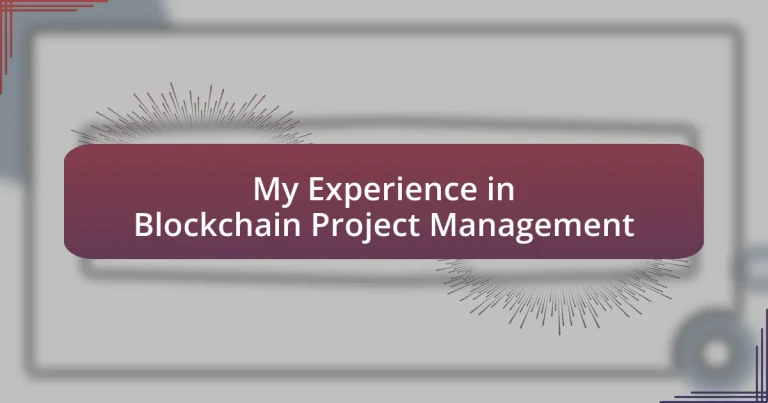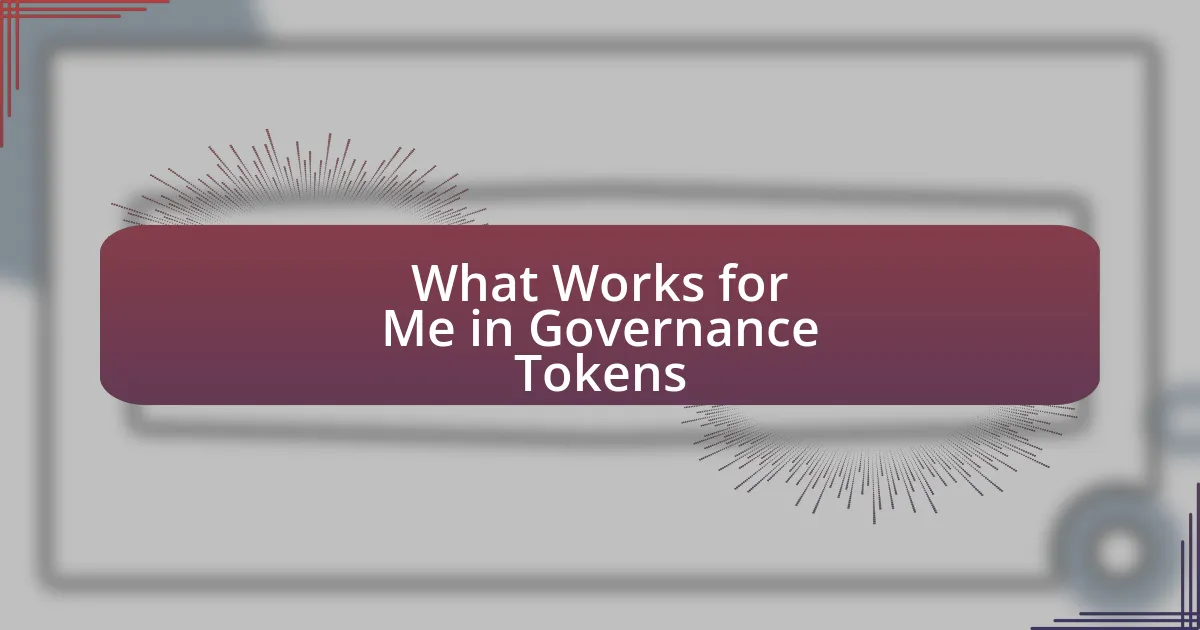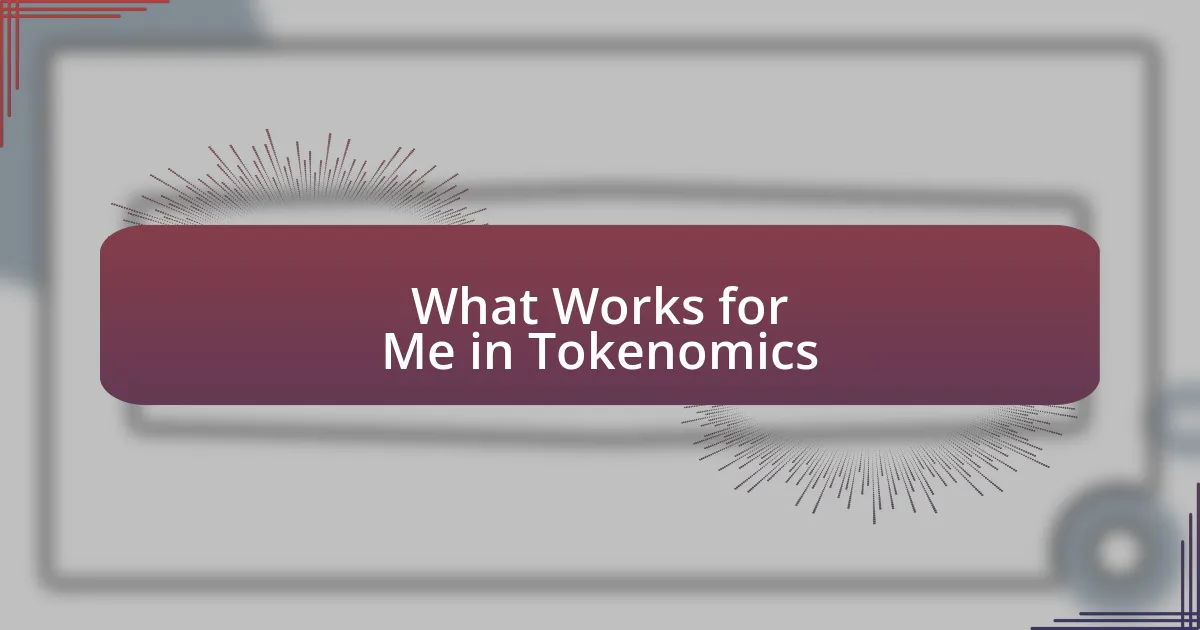Key takeaways:
- Effective blockchain project management requires clear communication and adaptability to navigate complex challenges and regulatory compliance.
- Understanding the fundamentals of blockchain, including concepts like immutability and smart contracts, is essential for facilitating innovation and progress.
- Utilizing appropriate tools and technologies, such as project management and communication platforms, enhances teamwork and accountability in blockchain projects.
- Fostering a collaborative culture and engaging stakeholders early can significantly improve project outcomes and team morale.
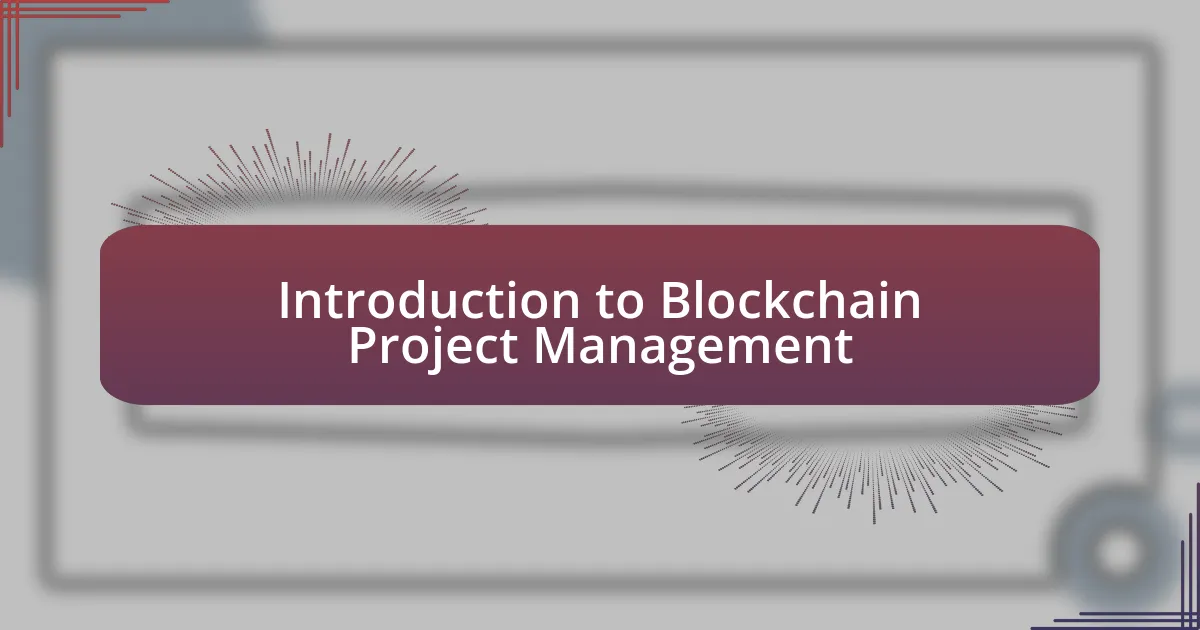
Introduction to Blockchain Project Management
Blockchain project management is a fascinating blend of traditional project management principles and the unique attributes of blockchain technology. I remember my first encounter with a blockchain project; I was struck by the complexity of coordinating various stakeholders with differing levels of understanding. How do you effectively communicate the potential of blockchain to someone still navigating the basics?
In my experience, the key to successful blockchain project management lies in adapting roles and responsibilities to fit the decentralized nature of the technology. I once managed a project where team members were spread across multiple time zones, each bringing their own expertise and cultural perspectives. It was challenging but also rewarding to witness how this diversity fueled innovation. Have you ever considered how collaboration can lead to unexpected breakthroughs?
Additionally, understanding blockchain’s rapidly evolving landscape is crucial. When I first delved into this field, I often found myself overwhelmed by new developments and trends. This constant change requires a proactive approach to learning and adapting strategies. How do you keep up with the ever-evolving nature of technology in your projects? For me, maintaining a continuous learning mindset has proven to be invaluable in navigating the challenges of blockchain project management.
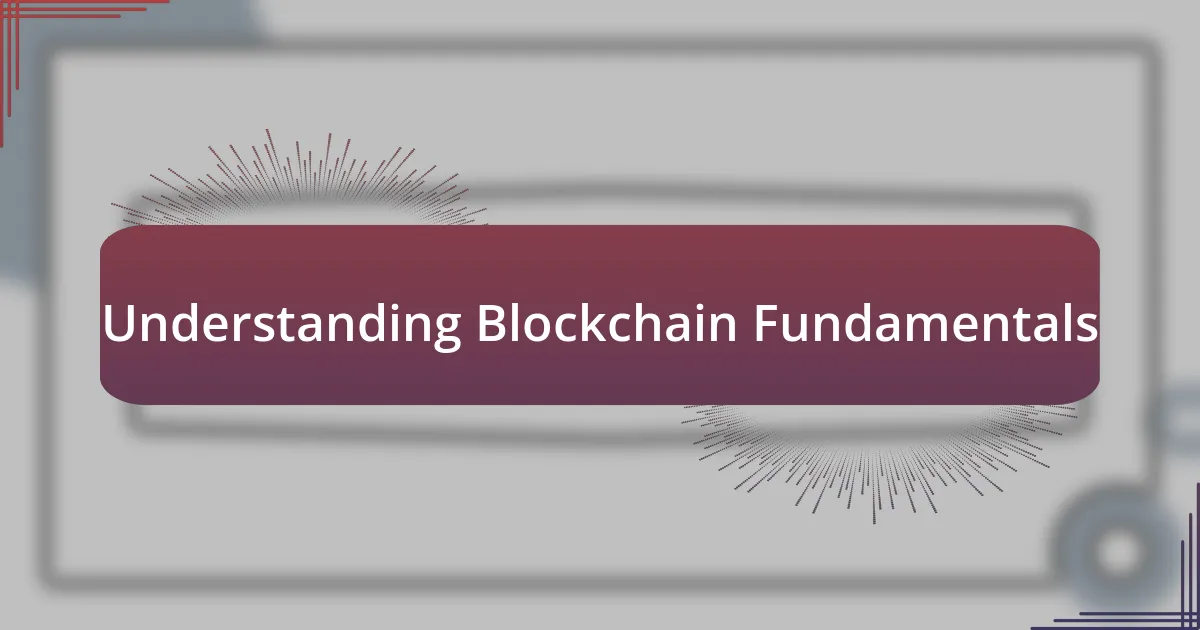
Understanding Blockchain Fundamentals
Blockchain technology is more than just a buzzword; it represents a paradigm shift in how information is recorded and shared. During my first project managing a decentralized application, I grappled with how this distributed ledger technology works. The thrill of watching transactions validated across a network of computers, rather than stored in a single database, gave me a deeper appreciation for transparency and security. This experience highlighted the importance of grasping key concepts like immutability and consensus algorithms, which ensure that once data is entered into a blockchain, it cannot be altered.
In another project, I encountered the challenges of scalability. As our user base grew, I was tasked with exploring how to maintain high performance without sacrificing the core principles of decentralization. It was a learning curve; I often found myself immersed in discussions about layer-2 solutions and sharding. I remember brainstorming sessions where team members would throw around ideas, fueled by the energy of knowing we were pushing technology’s boundaries. Have you faced a similar situation where the potential for growth made the technical details feel overwhelming?
Finally, the concept of smart contracts truly revolutionized my understanding of blockchain. These self-executing contracts with the terms of the agreement directly written into code present a new way to facilitate and enforce agreements. I vividly recall a client meeting where I demoed a prototype of a smart contract application, watching my audience go from skeptical to excited as they grasped the possibilities it opened up. That moment underscored the transformative power of blockchain technology in various sectors. It’s a reminder of how, even as we manage our projects, we are paving the way for innovations that will redefine industries.
| Concept | Description |
|---|---|
| Immutability | Once data is written to the blockchain, it cannot be changed or deleted, ensuring integrity. |
| Consensus Algorithms | Methods used to achieve agreement among network participants on which transactions are valid. |
| Scalability | The capability of the blockchain to handle growing amounts of work or its potential to accommodate growth. |
| Smart Contracts | Self-executing contracts with the agreement directly written into code, eliminating the need for intermediaries. |
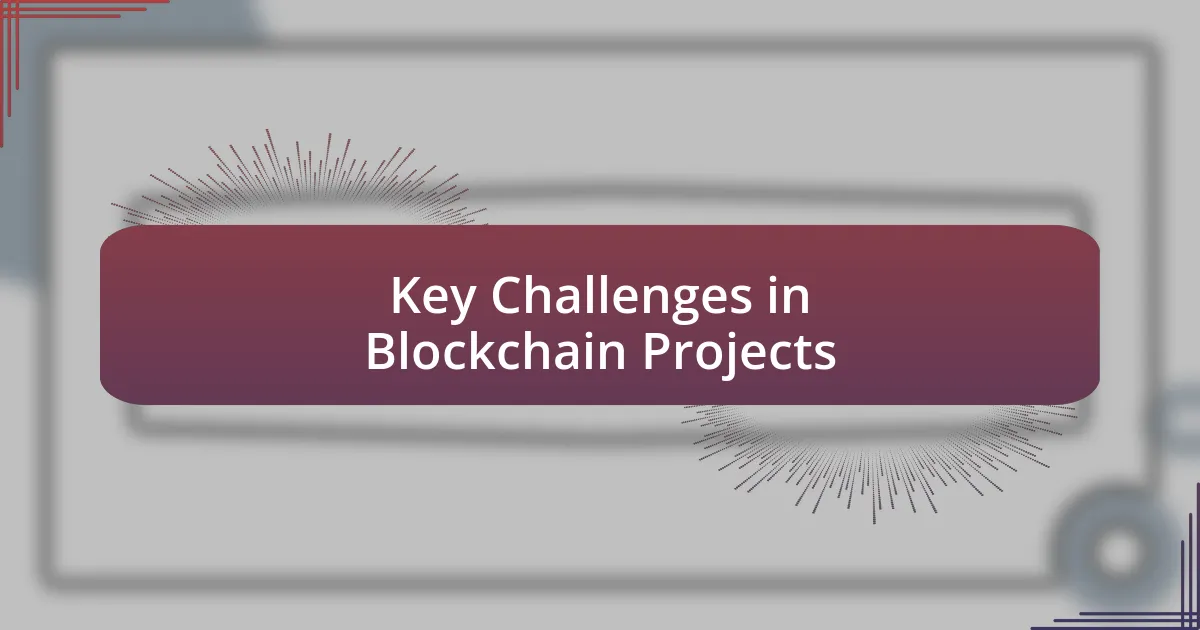
Key Challenges in Blockchain Projects
One significant challenge I encountered in blockchain project management was navigating regulatory compliance. Given the evolving nature of blockchain legislation, I often felt a bit like a tightrope walker, balancing innovation with adherence to laws. I vividly recall a project where our team had to pivot strategies mid-development because new regulations were announced, forcing us to re-evaluate our approach. This experience taught me that staying informed and adaptable is crucial to overcoming legal hurdles in this rapidly changing landscape.
- Regulatory changes can happen at lightning speed, impacting project timelines.
- Understanding regional laws and international regulations requires constant vigilance.
- Compliance often demands additional resources, both in terms of time and expertise.
- Engaging legal experts early on can mitigate future complications.
- Fostering open communication within the team helps address uncertainties promptly.
Another challenge is the integration of legacy systems with blockchain technology. In one project, I remember the frustration of attempting to connect an older database with our new blockchain solution. The technical difficulties led to heated discussions among my team, filled with moments of both confusion and creativity. This experience underscored the importance of not only technical knowledge but also strong change management skills to guide teams through the complexities of adapting to new solutions.
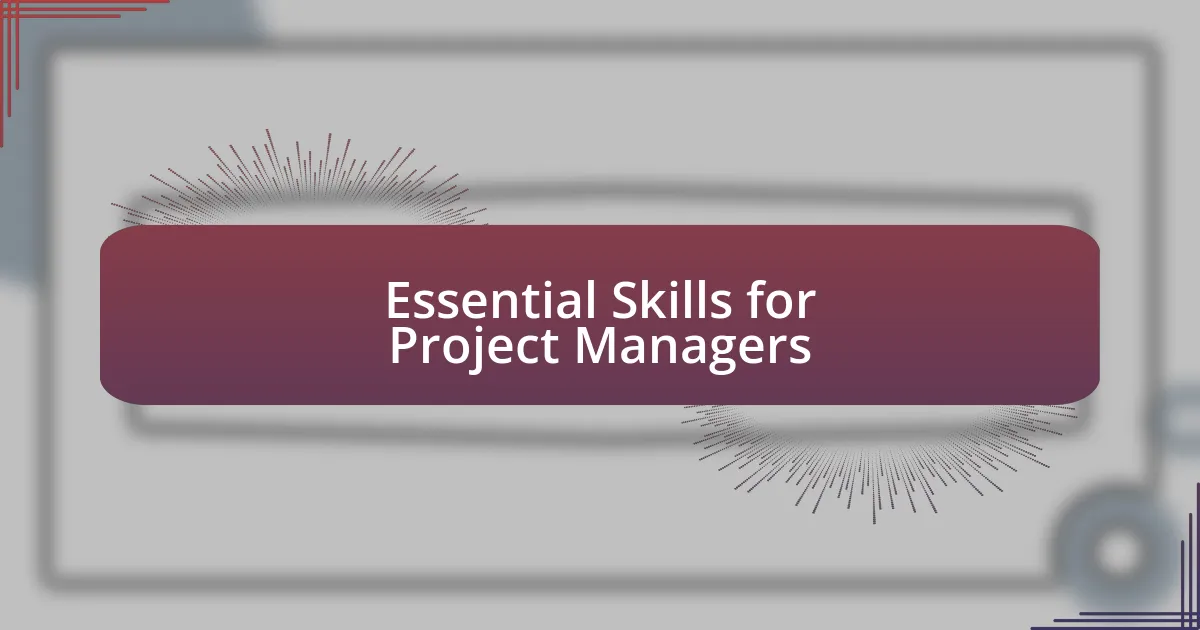
Essential Skills for Project Managers
When it comes to project management in the blockchain realm, communication skills are non-negotiable. I learned this lesson the hard way during a particularly challenging project where misunderstandings between team members led to implementation delays. The moment I realized that clear, open lines of communication could have prevented those roadblocks was an eye-opener. Could this have been avoided with better dialogue? Absolutely.
Another critical skill is adaptability. I recall a project where our initial plan was thrown into disarray due to unexpected technical difficulties. Instead of panicking, I rallied the team to brainstorm alternative solutions. The ability to pivot quickly not only salvaged that project but also strengthened the team’s resilience. Have you ever felt the pressure of a tight deadline while the ground beneath you shifts? It’s a humbling experience that highlights the value of being flexible.
Lastly, having a keen understanding of technical aspects is essential. While I’m not a developer, I’ve found that maintaining a basic grasp of blockchain technology helped me make informed decisions. In one project, my limited technical knowledge allowed me to bridge the gap between developers and stakeholders, facilitating smoother progress. Wouldn’t you agree that creating a common language fosters a collaborative environment? I’ve seen firsthand how it encourages innovation and enhances team synergy.
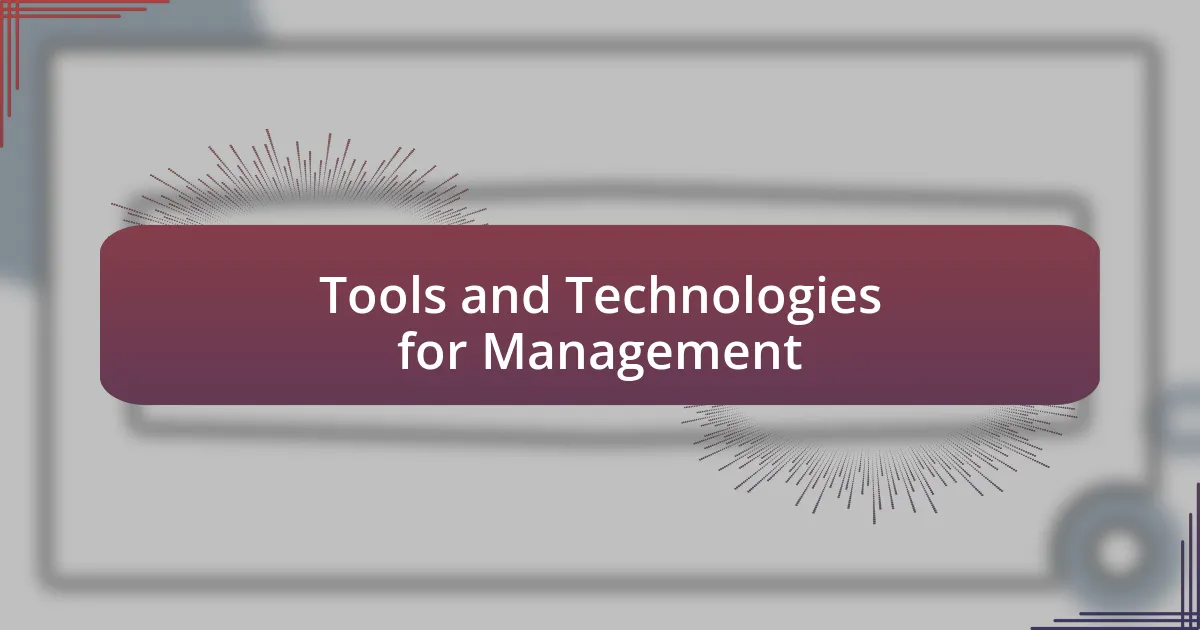
Tools and Technologies for Management
Managing a blockchain project effectively requires the right set of tools and technologies that cater to its unique challenges. In my experience, project management software like Trello and Asana can transform the way teams collaborate. When I first integrated Trello into a project, I was amazed at how visual boards could clarify tasks and timelines, providing the entire team with a shared understanding of progress. Have you ever watched a project come together seamlessly just because everyone was on the same page? It’s a game changer.
Then there are communication tools like Slack and Microsoft Teams that are invaluable for maintaining real-time dialogue among team members. I vividly remember a tight deadline where our team had to make quick decisions on feature updates. Using Slack, we created dedicated channels for specific discussions, which fostered immediate feedback and kept the momentum going. Isn’t it fascinating how the right technology can bridge physical distances and create a sense of urgency?
Lastly, utilizing blockchain-specific platforms, such as GitHub, is crucial for code management and version control. In one of my previous projects, we faced challenges tracking the latest developments, but once we adopted GitHub, the clarity it provided was remarkable. I appreciated how it allowed us to track changes meticulously, ensuring everyone worked on the most recent code base. Have you found that sometimes the simplest solutions end up being the most effective? In my journey, I’ve come to realize that these tools not only enhance productivity but foster a sense of accountability among team members.
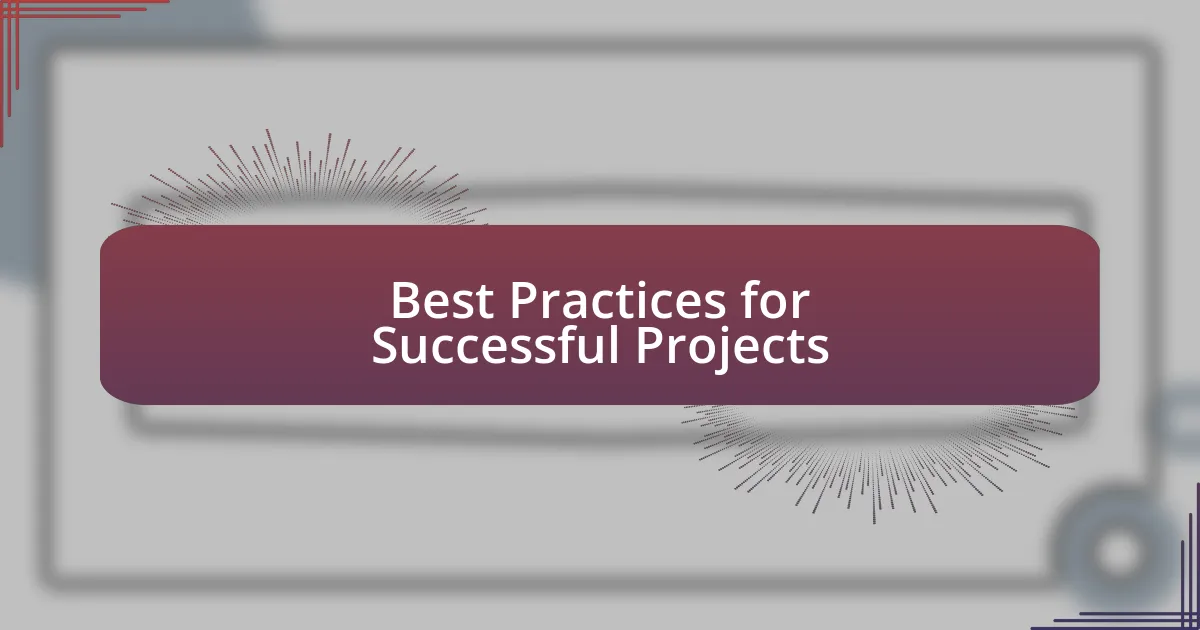
Best Practices for Successful Projects
One of the best practices I’ve found for successful blockchain project management is the importance of clear communication from the outset. Early in my career, I led a team where we failed to define roles and responsibilities, resulting in confusion and overlap. It was a tough lesson, but I learned that establishing a clear structure fosters accountability and helps everyone understand their contribution. Have you ever noticed how projects seem to stall when no one knows who is doing what?
Another valuable lesson is prioritizing continuous learning and adaptation throughout the project lifecycle. I recall an instance when we faced unexpected regulatory changes that required us to pivot quickly. Instead of viewing this as a setback, we came together to brainstorm solutions, which not only resolved the immediate issue but also built team resilience. I truly believe that embracing change can lead to innovation—how do you handle unforeseen challenges in your projects?
Finally, I strongly advocate for regular check-ins and feedback loops. During one particularly intense project, we implemented bi-weekly reviews to assess our progress and adjust our strategies. This practice not only kept our momentum going but also allowed for collective reflection, which sparked new ideas and improved our approach. Have you experimented with structured feedback sessions? Trust me, they can lead to insights that transform project dynamics.
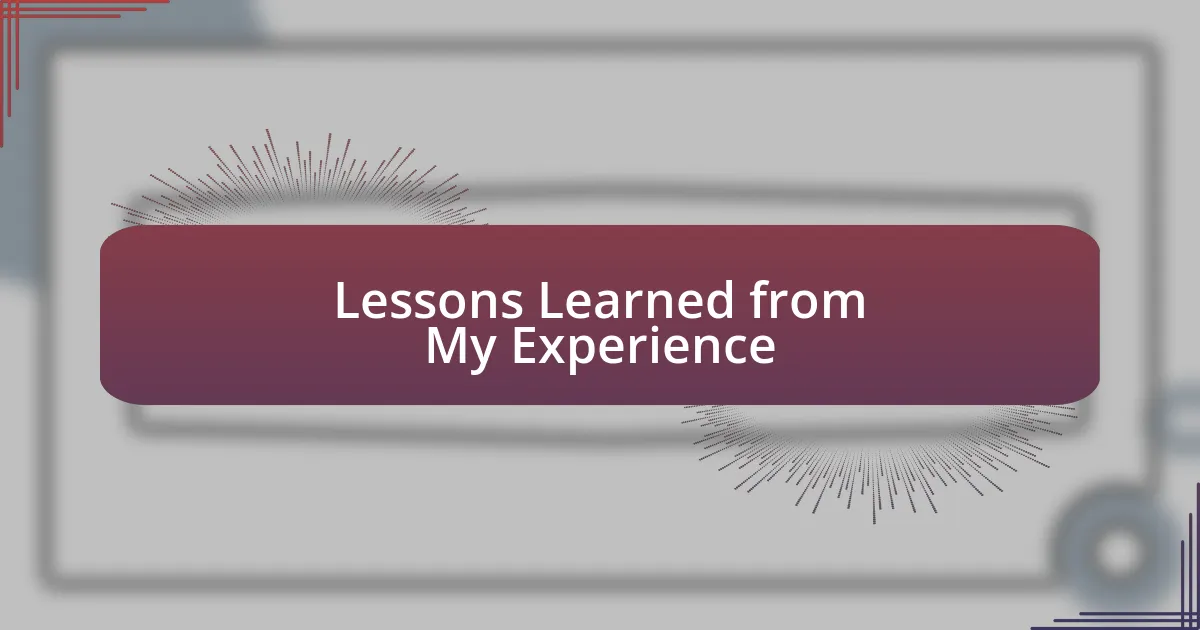
Lessons Learned from My Experience
One crucial lesson I learned is the necessity of fostering a collaborative team culture. I remember a project where collaboration was lacking; team members worked in silos, and it quickly became evident in our output. The moment I encouraged open dialogue through brainstorming sessions, the creative energy in the room was palpable. Have you ever felt the magic of ideas flowing freely among a team? It’s a game-changer for project success.
I also discovered the significance of setting realistic milestones. Early on, I aimed too high, and when we missed our ambitious targets, morale dipped. It struck me that celebration comes from achieving smaller, manageable goals that contribute to a larger vision. When was the last time you celebrated a small win in your projects? It’s those moments that keep the momentum alive.
Another lesson was the power of stakeholder engagement. There was a time when I underestimated the influence of stakeholders and their feedback. After some initial setbacks, I began involving them earlier in the process, and their insights became invaluable. This shift not only aligned our vision but also created a sense of ownership among stakeholders. Have you considered how positively your projects could be impacted by increased stakeholder involvement? It makes a world of difference.

